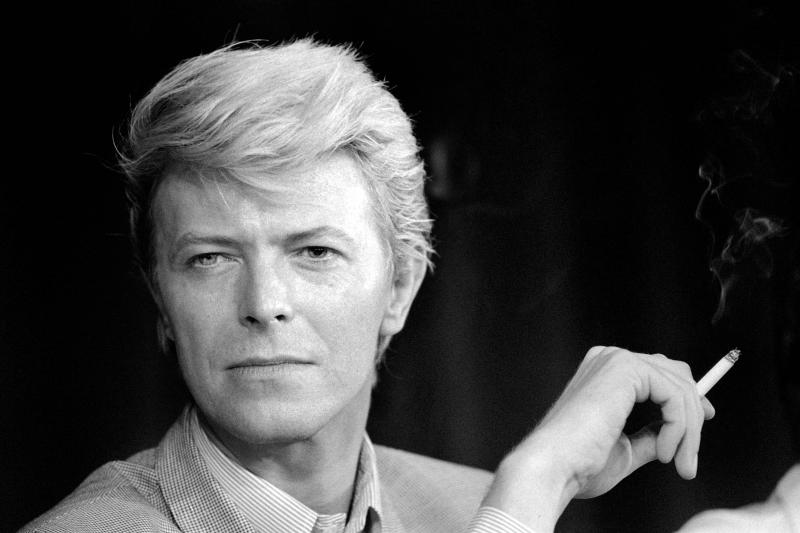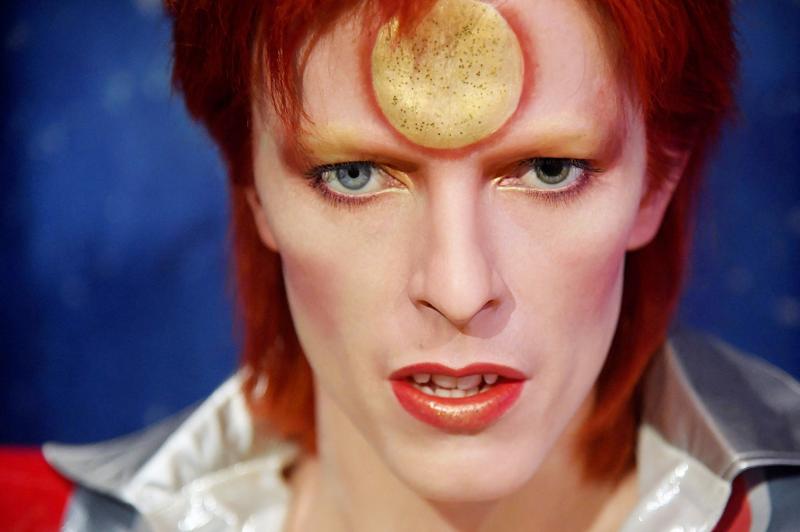It is half a century since Ziggy Stardust — a character that turned David Bowie into an intergalactic star and revolutionized sexual politics in the process — crashed onto Earth. The London singer had spent a decade trying to refine his stage persona, but despite a couple of hits — 1969’s Space Oddity and Changes two years later — he had yet to achieve the stardom he craved.
“He had failed in everything he tried since the beginning of his career,” said Jerome Soligny, one of the world’s leading Bowie experts and author of David Bowie: Rainbowman.
But on June 16, 1972, The Rise and Fall of Ziggy Stardust and the Spiders from Mars finally pulled together all the elements he had been absorbing. There was the dirty rock of Iggy Pop and Lou Reed whom he had met in New York, the mime and theater he had studied in London, boiler suits from A Clockwork Orange and wild, androgynous styles from the underground gay clubs he frequented with his wife.

Photo: AFP
Into the melting pot went Bowie’s memories of veteran rocker Vince Taylor, who had gone off the rails and believed he was an alien god, and his obsession with a Texas country singer known as Legendary Stardust Cowboy.
And out came an alter-ego in Ziggy Stardust — a pan-sexual alien rockstar from outer space who fed a hunger in pop culture for something radical and shocking after too many years of long-haired hippies. “We wanted nothing to do with the sixties,” Bowie later said. “We were determined that we were at the beginning of the 21st century. We wanted to wipe out everything that went before.”
BEAUTIFUL CREATION

Photo: AFP
Crucial to the impact of the album was an interview he gave British music weekly Melody Maker a few months before its release.
“I’m gay and always have been, even when I was David Jones,” he said, resplendent in his red spiky hair, skin-tight jumpsuit and red plastic boots.
It was shocking at the time — the first major celebrity to come out, less than five years after homosexuality was decriminalized in Britain.

Photo: Reuters
Soon, this attitude would make him an icon, providing a psychological lifeline for generations of queer kids and outsiders.
“It was marketing before its time — [that statement] was his most beautiful creation and it allowed him to hatch, to become something more than a well-kept secret among the rock intelligentsia,” Soligny said.
‘PSYCHOLOGICAL DESTRUCTION’
Still, it took a while to catch on.
The shows were a radical change from the norm, with multiple costume changes and a story arc, but barely a dozen people showed up to some of the early Ziggy concerts — and sometimes they were booed off stage.
An appearance in July on the legendary BBC show Top of the Pops, followed by a hugely successful US tour, changed all that. It helped that there was more to Bowie than showmanship and shock value — a sophistication missing from many of his glam-rock peers.
The album remains a bona fide rock classic, packed with hits like Starman, Suffragette City and the title track. Crucially, as Rolling Stone magazine wrote at the time, Bowie “never made his sexuality anything more than a completely natural and integral part of his public self, refusing to lower it to the level of gimmick.”
Very quickly, Bowie became one of the defining artists of his generation.
And just as abruptly, he ended it — announcing at a gig in London in July 1973 that Ziggy was no more.
The success had made it dangerously hard to separate the Ziggy storyline from reality.
“With the help of some chemical substances at the time, it became easier and easier for me to blur the lines between reality and the blessed creature that I created... Then you start on the trail of chaotic psychological destruction,” Bowie later recalled.
Ziggy was dead, but Bowie had set a template for creating characters that he would continue with huge success in the years to come.

Earlier this month the Interpret: China series at the US-based Center for International and Strategic Studies (CSIS) published a translation of a piece from the “Cross-Strait Institute of Urban Planning” at Xiamen University, arguing that the People’s Republic of China (PRC) should begin preparing for the occupation of Taiwan after a successful invasion. It was swiftly deleted. The “institute” is one of the many faux research organizations the PRC has established to give its propaganda a scholarly veneer. The article, “Start Taiwan Takeover Preparations as Soon as Possible,” whose authors were not named (though CSIS presented them as “experts”), called

This is the summer of hell for the Taiwan People’s Party (TPP) and their leader Ko Wen-je (柯文哲). In just the last few weeks the party has imploded. The question now is if they will have any future as an electable party or not. The first blow fell on July 26, when the party’s Hsinchu Mayor Ann Kao (高虹安) was convicted on corruption charges and sentenced to seven years and four months in prison and suspended as Hsinchu mayor. She left the TPP in disgrace. Then starting on Aug. 8, in quick succession the party became embroiled in three new

Last spring, Donald Trump was arrested and arraigned for hush-money payments made to the adult film star Stormy Daniels. For a popular online content creator who goes by the moniker Sneako, the moment seemed to crystallize all of his dark thoughts about America and its coming election. “Nobody is surprised that Trump was arrested,” he tweeted. “Everybody on both sides knows it’s rigged.” Sneako, 25, whose real name is Nico Kenn De Balinthazy, had been chasing online fame since he was a teen, first with apolitical gaming videos and slightly wooden man-on-the-street interviews, often about dating, before working briefly for the wildly

Aug. 19 to Aug. 25 The situation was getting increasingly dire for the indigenous Mrqwang and Mknazi Atayal living near Hsinchu County’s Lidong Mountain (李崠山). Largely left alone during the first decade of Japanese colonization, they watched as their northern brethren fell one by one under the aggressive leadership of governor-general Samata Sakuma, who assumed the position in 1906. In late 1910, the Japanese defeated their close allies, the Mkgogan, and although the Mrqwang and Mknazi managed to repel an invasion the following year, the Japanese constructed frontier defenses and three hilltop fortresses with